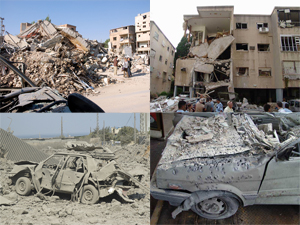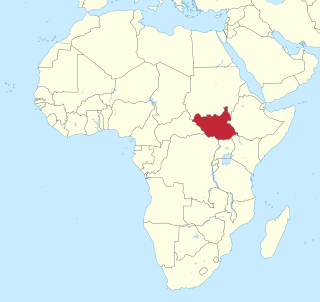
Peacekeeping comprises activities, especially military ones, intended to create conditions that favor lasting peace. Research generally finds that peacekeeping reduces civilian and battlefield deaths, as well as reduces the risk of renewed warfare.
The United Kingdom is a founding member of the United Nations and one of five permanent members of the UN Security Council.

United Nations Security Council Resolution 1679, adopted unanimously on May 16, 2006, after recalling resolutions 1556 (2004), 1564 (2004), 1574 (2004), 1590 (2005), 1591 (2005), 1593 (2005), 1663 (2005) and 1665 (2006) on the situation in Sudan, the Council endorsed a decision by the African Union Peace and Security Council to move ahead with a United Nations peacekeeping force in Darfur as soon as possible.

United Nations Security Council Resolution 1706, adopted on August 31, 2006, after recalling previous resolutions on the situation in Sudan, including resolutions 1556 (2004), 1564 (2005), 1574 (2004), 1590 (2004), 1591 (2005), 1593 (2004), 1663 (2006), 1665 (2006) and 1679 (2006), the Council expanded the mandate of the United Nations Mission in the Sudan (UNMIS) to include deployments in Darfur to enforce the Darfur Peace Agreement.
The Report of the Panel on United Nations Peace Operations (2000) is commonly called the Brahimi Report, named for the chairman of the commission that produced it, Lakhdar Brahimi. UN Secretary-General Kofi Annan had convened the Panel on March 7, 2000, ahead of the upcoming Millennium Summit, and had tasked it with making a thorough review of United Nations peace and security activities and recommending improvements. The report was published on August 17, 2000. In identical letters dated 21 August 2000 transmitting the report to the presidents of the UN General Assembly and the UN Security Council, Annan called the Panel's recommendations "essential to make the United Nations truly credible as a force for peace."

The Millennium Summit was a meeting among many world leaders, lasting three days from 6 to 8 September 2000, held at the United Nations headquarters in New York City. Its purpose was to discuss the role of the United Nations at the turn of the 21st century. At the meeting, world leaders ratified the United Nations Millennium Declaration. This meeting was the largest gathering of world leaders in history as of 2000. It was followed five years later by the World Summit, which took place from 14 to 16 September 2005.

United Nations Security Council resolution 1170, adopted unanimously on 27 May 1998, after considering the situation across the African continent, the Council decided to establish an ad hoc Working Group to review the Secretary-General Kofi Annan's recommendations concerning the maintenance of international peace and security in Africa.

United Nations Security Council resolution 1197, adopted unanimously on 18 September 1998, after reaffirming its primary responsibility to maintain international peace and security, the Council addressed co-operation efforts with the Organisation of African Unity (OAU).

United Nations Security Council resolution 1327, adopted unanimously on 13 November 2000, after recalling Resolution 1318 (2000) adopted at the Millennium Summit and receiving the Report of the Panel on United Nations Peacekeeping, the Council adopted a resolution concerning the improvement of its peacekeeping operations.

United Nations Security Council resolution 1353, adopted unanimously on 13 June 2001, after recalling resolutions 1318 (2000) and 1327 (2000), the Council agreed on proposals to strengthen the relationship of the United Nations with troop-contributing countries and the Secretariat in peacekeeping operations.

United Nations Security Council resolution 1366, adopted unanimously on 30 August 2001, after reaffirming resolutions 1196 (1998), 1197 (1998), 1208 (1998), 1265 (1999), 1296 (1999), 1318 (2000), 1325 (2000) and 1327 (2000) concerning aspects of armed conflict, the Council reiterated its aim to prevent armed conflict as part of its responsibility to maintain international peace and security.

United Nations Security Council resolution 1379, adopted unanimously on 20 November 2001, after recalling resolutions 1261 (1999), 1265 (1999), 1296 (2000), 1306 (2000), 1308 (2000), 1314 (2000) and 1325 (2000), the Council considered provisions to protect children during peacekeeping operations and requested the Secretary-General to identify parties to conflict that used or recruited child soldiers.
United Nations Security Council Resolution 1935, adopted unanimously on July 30, 2010, after reaffirming all previous resolutions and statements on the situation in Sudan, the Council extended the mandate of the African Union – United Nations Hybrid Operation in Darfur (UNAMID) for a further 12 months until July 31, 2011 and demanded an end to fighting and attacks on United Nations personnel and civilians.

United Nations Security Council resolution 1625, adopted unanimously at the 2005 World Summit on 14 September 2005, the Council adopted a declaration on the role of the Security Council in conflict prevention, particularly in Africa where many armed conflicts were taking place.

United Nations Security Council resolution 1631, adopted unanimously on 17 October 2005, after recalling Chapter VIII of the United Nations Charter, the council addressed co-operation between the United Nations and regional organisations in the maintenance of international peace and security.

United Nations Security Council Resolution 1983 was adopted unanimously on June 7, 2011, after recalling meetings on HIV/AIDS in Africa and in the mandates of peacekeeping operations, as well as resolutions 1308 (2000), 1325 (2000), 1820 (2008), 1888 (2009), 1889 (2009), 1894 (2009) and 1960 (2010). The Council encouraged the inclusion of HIV/AIDS prevention, treatment, care and support in its peacekeeping mandates.

United Nations Security Council Resolution 1996, adopted unanimously on July 8, 2011, after welcoming the independence of South Sudan from Sudan, the Council established the United Nations Mission in the Republic of South Sudan (UNMISS) for an initial period of one year.
United Nations Security Council Resolution 1809 was unanimously adopted on 16 April 2008.

The African-led International Support Mission to the Central African Republic was an African Union peacekeeping mission to the Central African Republic. It was established on 5 December 2013 by United Nations Security Council resolution 2127 to stabilise the country as a result of the Central African Republic conflict under the Djotodia administration and following the 2013 Central African Republic coup d'état.















